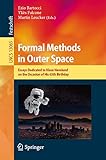Formal Methods in Outer Space [electronic resource] : Essays Dedicated to Klaus Havelund on the Occasion of His 65th Birthday /
Material type: TextSeries: Programming and Software Engineering ; 13065Publisher: Cham : Springer International Publishing : Imprint: Springer, 2021Edition: 1st ed. 2021Description: XII, 193 p. 40 illus. online resourceContent type:
TextSeries: Programming and Software Engineering ; 13065Publisher: Cham : Springer International Publishing : Imprint: Springer, 2021Edition: 1st ed. 2021Description: XII, 193 p. 40 illus. online resourceContent type: - text
- computer
- online resource
- 9783030873486
- 004.0151 23
- QA75.5-76.95
The K Vision for the Future of Programming Language Design and Analysis -- Refining the Safety-Liveness Classification of Temporal Properties According to Realizability -- Domain Analysis & Description – Sorts, Types, Intents -- Dynamic interval analysis by abstract interpretation -- Runtime Verification: Passing on the Baton -- Hardware-Assisted Online Data Race Detection -- Comparing two methods for checking runtime properties -- Confidence Monitoring and Composition for Dynamic Assurance of Learning-Enabled Autonomous Systems -- Collision-Free 3D Flocking Using the Distributed Simplex Architecture -- A Context-Free Symbiosis of Runtime Verification & Automata Learning -- Reverse Engineering through Automata Learning.
This Festschrift, dedicated to Klaus Havelund on the occasion of his 65th birthday, celebrated in 2021 due to the COVID-19 pandemic, contains papers written by many of his closest friends and collaborators. After work as a software programmer in various Danish companies, Klaus has held research positions at various institutes, including the Danish Datamatics Center, the Ecole Polytechnique, LIP 6 lab in Paris, Aalborg University, and NASA Ames. Since 2006 he has been working in NASA’s Jet Propulsion Laboratory (JPL), the federally funded center managed by Caltech whose primary function is to construct and operate planetary robotic spacecraft. His professional awards include the Turning Goals Into Reality engineering innovation award, the Outstanding Technology Development award, and the JPL Mariner, Ranger, Voyager, and Magellan awards. Klaus has provided constant and generous service to the formal methods community by organizing, participating in, and chairing numerous committees. His academic awards include the 2020 SIGSOFT Impact Paper Award, the RV 2018 Test of Time award, and the ASE 2014 and ASE 2016 Most Influential Paper awards. His research activities have generated more than 100 publications with more than 100 collaborators, cited over 12,000 times. The book title reflects Klaus’s main research and engineering focus throughout his career: formal methods, often applied at NASA. The contributions, which went through a peer-review process, cover a wide spectrum of the topics related to his scientific interests, including programming language design, static analysis, runtime verification, dynamic assurance, and automata learning.


There are no comments on this title.